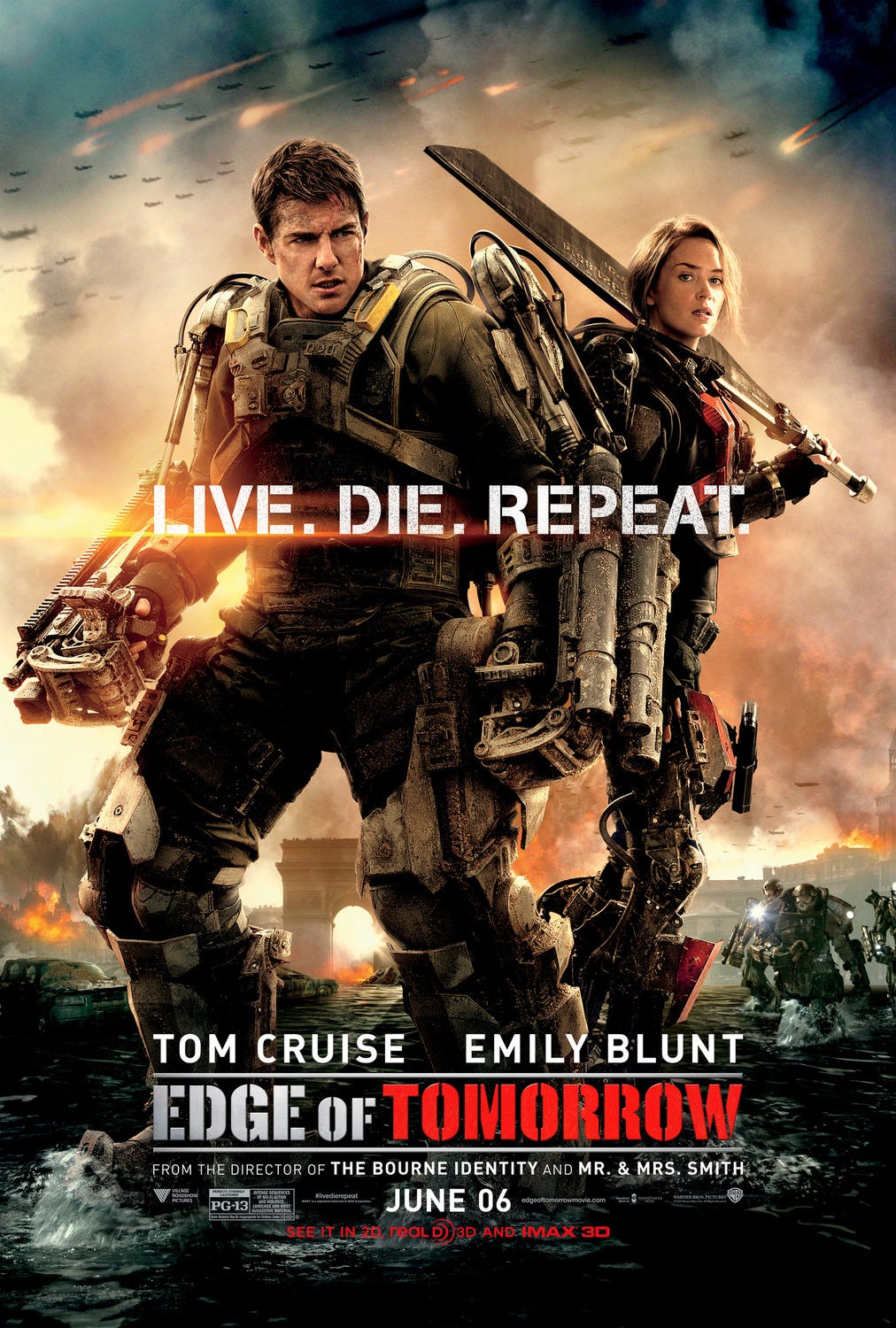Learning by (Re)iteration: how repetition and reflection drives our learning
Act. Reflect. Repeat.
I. Dal Capo
Live. Die. Repeat.
The tagline to Tom Cruise's sci-fi flick, Edge of tomorrow. His character gains the power to reset his day when he dies. Each time he learns from his past mistakes, adapting his tactics. Soon, he improves and outperforms everyone else.
This isn't just science fiction, it mimics real life. It’s how we learn: not through sudden breakthroughs, but through cycles of action, feedback, reflection and refinement.
II. Rinse. Repeat.
This repetition is the engine of learning. We have to do things and reiterate several times over. But the key here is systematic effort, not mindless practice.
This is known as deliberate practice. According to psychologist Anders Ericsson, deliberate practice involves setting an objective for skill practice, practice with increasing difficulty, gain feedback, and then improve on the practice.
This deliberate approach doesn't just apply for individuals. Businesses go through the same process. Agile teams don’t just work—they plan, execute and evaluate. They improve their work and collaboration based on the feedback loop embedded in the process.
Whether it's a person, a manager or a company, we learn best by deliberately pin-pointing our weaknesses, raising the difficulty level and getting constant feedback.
III. Expecting Different Results
Iteration alone won’t get you far. Without feedback, it’s like spinning your wheels without moving forward.
Picture Tom Cruise in Edge of Tomorrow: without analyzing where he went wrong after each reset, he'd just be dying over and over for nothing. He had feedback. Tom Cruise had Rita Vrataski (played by Emily Blunt) who pushed him to the limit, mentoring him, giving him feedback.
Feedback, often from a coach or mentor, gives us that critical perspective. Feedback shows us where we slipped, where we can work on and how to do it better next time.
But feedback on its own is just noise unless you know how to use it. Not all feedback is useful. Some will help you grow, while other feedback can derail you if you’re not discerning. Like Wile E Coyote falling into his own traps again and again and never catching the Road Runner. Good feedback is actionable and helps you achieve your goals.
However, it’s not enough to simply collect data; you need to process and reflect on it.
Reflection lets you sift through feedback and focus on what really drives progress, filtering out the noise. It lets you identify what’s constructive for you and then implement it in practice.
It’s not iterating mindlessly, learning develops in moments of reflection. This deliberate pause is where real progress happens. Otherwise you’re just running in place. You need a system to refine your approach. For example, like PDSA or OODA loops. These frameworks provide a disciplined structure. They ensure feedback conscientiously integrated to improve results.
Effective learning isn’t just about doing the work—it’s about doing it better each time, and paying attention to what you’re doing and how the world responds to you.
IV. Reprise
A big part of learning—something that’s often unsaid—is failure. To learn is to fail, and to fail repeatedly.
To learn means we have to voluntarily put ourselves through this cycle of failure many times over. It’s mind-numbing. It’s painful. It feels like a part of us just died.
But failure is feedback. Each misstep is a step forward as long as you’re willing to learn from it. Failure teaches us that there’s room to grow. Tom Cruise1 had to die countless times to inch closer to success. Live. Die. Repeat.
Unfortunately, we don’t have the luxury of resetting our lives when we die.
Yet, we don’t have to die either, we just have to get better.
So take heart—every failure isn’t a setback, it’s an essential step toward your goals.
Inspirations
Edge of Tomorrow (2014)
Not often do you get Tom Cruise doing hard sci-fi flicks, and he has done more than a handful of them (Minority report, Oblivion). But this is pretty damned good. It’s got a focused story and despite the violence, it’s kinda funny. As far as Tom Cruise movies go, I think this is one of his best work.
Inferno
The follow up to X-men: House of X/Powers of X, which I covered last week. It follows up on Moira’s plans for the mutants, and the costs of Moira, Prof X and Magneto’s secrecy. The machines are winning because they too can learn from their future.
CommonCog posts on Learning
Cedric Chin and Co over at CommonCog has built an extensive blog ranging from career advice, mental models to improving business operations. Their series on accelarating learning is informative and certainly changed the way I learn.
Freakonomics: How to Succeed at failing
A 4-part podcast series exploring the question of failing, how to fail better (with grace) and how failure leads to greater successes. there’s even a bonus episode featuring David Duchovny.
About Practice
I quite enjoyed this piece from working theorys, on the importance of practice and how engage with practicing vs performing
Practice is about the process. Performance is about the payoff.
Practice is about progress. Performance is about praise.
Practice is for yourself. Performance is for other people.
What you like to practice is what’s worth pursuing. Getting to perform is just a bonus.
his character. Not Tom Cruise the person.



